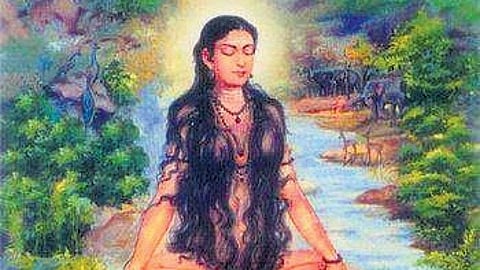

To take up from last week, I would like to share stories about Lal Ded, an outstanding figure in Kashmiri tradition from the mid-14th century. We are told ‘Lalla’, meaning ‘seeker’, was married off young, at the age of 12.
Cherished as Lalleshwari by Kashmiri Pandits and as Lal Ded or Lalla Arifa by Kashmiri Muslims, she is said to have been born in 1355 CE at Pandrethan (Puranadhisthana), about 12 km southeast of Srinagar, to a Kashmiri Pandit family. Lalla fell into the classic ‘feeble husband-hostile mother-in-law’ trap that unfortunately needs no elaboration even today. As is still the practice in some old-fashioned families, Lalla was given a new name by her in-laws; a total leaving behind of original identity.
‘Padmavati’ was made to do the hardest work and not fed properly. The story goes her mother-in-law would place a big stone on Lalla’s plate and cover it with rice to make it look like a heap of food. Lalla, who ate last as the one with the least status, would patiently wash the stone daily and put it back in the kitchen. Her father-in-law found out and reproved his wife, but it only made things worse. The mother-in-law poisoned her son’s ears, and further unkindness followed. The poor girl had to accept the prospect of spending her life loveless.
But when Lalla was 26, some breaking point was finally reached, for she just walked away from her ‘family’. Like Mahadevi Akka of Karnataka two hundred years earlier, she wandered around naked. She discovered a guru in the yogi Siddhi Srikanth and kept the company of renunciates and spiritual seekers. It is also said Lalla was taught spiritual matters by Nund Reshi, the influential Kashmiri saint who was an embodiment of Hindu-Muslim confluence. She eventually found meaning in life through her love for Shiva.
Lalla patiently endured human cruelty, pleaded to Shiva for relief and finally found him in all creation, as her poems show. I was helped in these translations back in 2000 by a Kashmiri Pandit friend who did the literal translation, which I then edited, amid her howls of mirth at my attempts to pronounce Kashmiri. I have transliterated here to share a sense of this faraway language, and any mistakes are wholly mine.
Lalla’s vaakhs initially have a sorrowful, accepting tone as in Tsaalun chu vuzmal t’trattuh/Tsaalun chu mandyin’yuh gattuh kaar/Tsalun chu paan-panun kaddun gratt’eh/Heytim’meul santush vat’e pann’y, meaning ‘Endure the lightning and thunder/ Endure the darkness at noon/ Endure the grinding millstone (of earthly life/ Endure, for He comes to you.’
It transforms into recognising ‘God-within’ as in Tsal’ tsitt’ vwandas bay’ mo ber/Chon tsinnth karaan paanuh Anaad/Ts’e kawuh zaanyuh khyod hari kar/Kival t’sa tsaandh’yuh taaruk naad, meaning ‘Fear not, O vagrant mind/ Eternal God takes care of you/ Cry then, to Him alone/ Cross (the Sea of Samsara) by His Name alone.’
She appeals to this greater power with Shiv yuh Keshav yuh Zin yuh/ Kamalajanaath namaadhaarin yuh/Meh abali kaastan bhavaraoz/Su vuh su vuh su vuh su, meaning ‘Shiva or Keshava or Jina? Or the lotus-born lord, Brahma? Whatever be his Name, Let him lift the world’s sickness from me, Be it He, or He or He.’
She reaches a place of acceptance and clarity with Mail vwandi zolum Jigar morum/Tel’ lal naav draam/Yel’uh dal’uh treiv’mas tat’e, meaning ‘I burnt the dirt in my soul, I killed my wayward heart, I spread my beggar’s cloth to Him. And so is Lalla known.’ She gradually attains the sensation that ‘God is in all things and all things belong to God’ and says, A’ndariy aayas tsa’ndru’y gihraan/Gihraan aayas hiheyn hih/ T’suh h’eu Naraan, t’suh h’eu Naraan/T’suh h’eu Naraan, yim kam vuh? Meaning ‘I searched within for the Moon (of Revelation), As like seeks out like: This is God, this is God, this is God, none else but God. What are these many things (made by You)?’
This is further expressed in verses of serene conviction like this: Shiv tsu’y thali thali rozan/Mo zan Hindu to Musalman/Ruk ay chuk pan panun parzanav/Soy chay Shivas sati zaniy zan meaning ‘Shiva pervades every place and thing; Do not say this is Hindu, that, Muslim; You are intelligent, recognise yourself; That is true kinship with God.’ Soon after this realisation happens, Lalla goes about the countryside trying to wean people away from the cruelty of ossified religious practice to the liberating and kindly path of true spirituality.
My favourite is Lal b’ tsaayas swaman baagabaras/Vuchum Shivas-Shakth milith t’vaah/ Tati lay karmas amritsaras/Zind’ maras t’me kari kyah? Meaning, ‘I, Lalla, entered blooming garden of my own mind, There I joyfully beheld Shiva united with Shakti. There then did I merge in the Lake of Nectar. Alive, I am unchained from birth and death: What can the world do to me?’
This very Upanishadic vaakh goes: Gagan tsu’y bhutal tsu’y/Tsu’y chuk deyn pavan ta raat/Arg tsandun posh poyni tsu’y/Tsu’y chuk soruy ta lagizi kyah? Meaning ‘You are the sky, you are the earth, the air, the hours, the sacrificial grain; You are the water, the sandal paste and flowers; You are already in everything. What shall I worship you with?’ It is like a prelude to Gagan mein thaal rav chand deepak, which is Guru Nanak’s similar, fabulous arati.
Finally, Lalla’s deeply Upanishadic message sketches Eternity for us: As’suhs/ As’si/T’as’asav, meaning ‘We were, We shall be, We have always been’. Her message: ‘Eternally, the sun sets to rise, Eternally, Shiva dissolves to create.’
Her precise date of death is unknown; it’s said she died in Bijbehara. Over thirty percent of Kashmiri idioms and proverbs are said to derive from her vaakhs.
(Views are personal)
(shebaba09@gmail.com)